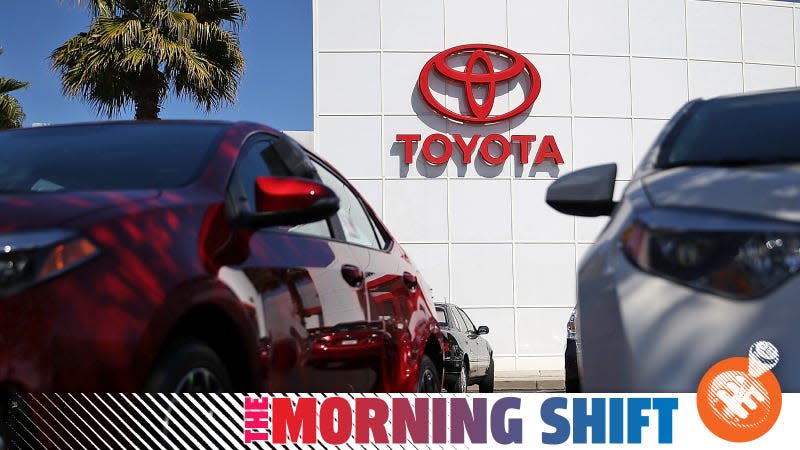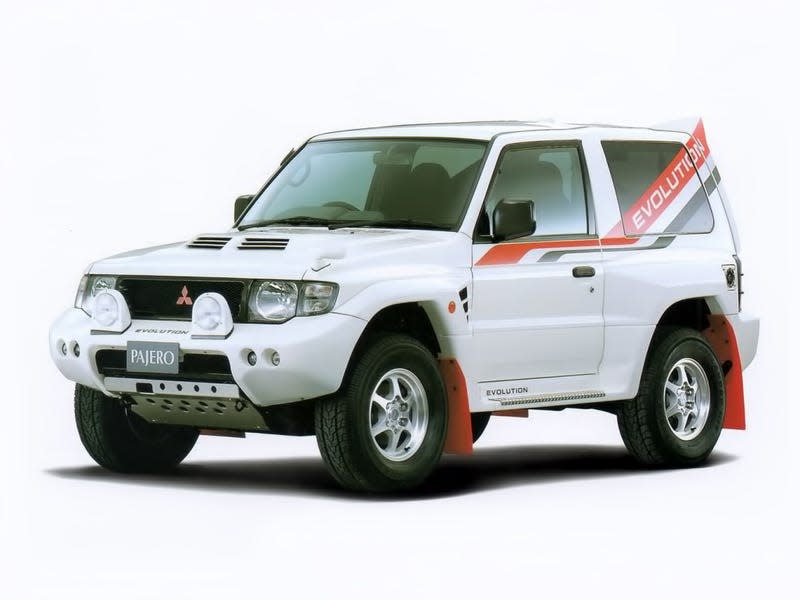Toyota Took 2022 Global Sales Crown Without Selling More Cars

Toyota is on top once again, Nissan and Renault have put the past to bed and Volvo won’t give up car subscriptions. All that and more in The Morning Shift for Monday, January 30, 2023.
1st Gear: Three-peat
Toyota’s done it again, beating second-place Volkswagen Group to sell the most cars globally last year. It wasn’t even close: the Japanese automaker moved 10.5 million cars in 2022 to Volkswagen’s 8.3 million. That’s more or less the same output Toyota achieved in 2021, and it was good enough for the No. 1 title for the third consecutive year. In 2020, Toyota had notched the top spot for the first time in five years beating — who else — Volkswagen.
Read more
The automaker attributed the strong performance to “solid demand centered around Asia,” according to Agence France Press via Barron’s:
“Despite the impact of production constraints caused by the spread of Covid-19, increased demand for semiconductors, and other factors, global sales were at the same level year-on-year as a result of solid demand centered around Asia,” the Japanese car giant said.
2022 also saw a slight jump in Toyota’s electrified sales. This being Toyota, “electrified” of course pretty much means conventional hybrids, some plug-ins and virtually no electric vehicles, save for those few people who were able to nab bZ4Xs before they were taken off the market.
In 2022, Toyota sold 2.7 million electrified vehicles, around five percent more than the previous year. The vast majority of those — 2.6 million — were hybrid models.
[...]
Mio Kato, an analyst at Lightstream Research who publishes on Smartkarma, told AFP that Toyota was likely to keep its top-selling crown in the near term.
“In terms of the actual volumes, it will still be difficult for Volkswagen or General Motors to surpass Toyota easily because both are under more pressure in China with their internal combustion engine business,” he said.
Electric-only carmakers like China’s BYD will one day pose “a genuine threat” to Toyota, he said, because they have strong battery technology and “more experience and better branding” with EVs.
It’s a good point. China’s auto sector is kind of moving toward a state of isolation again, as domestic brands are taking increasingly larger slices of the pie, particularly in the realm of EVs. Toyota, Volkswagen and General Motors all maintain joint ventures with local manufacturers, but that business strategy appears anything but healthy these days. Toyota will probably lose the region eventually, but so will its current global rivals. At which point the state of play will start looking awfully different.
2nd Gear: Nissan and Renault Have Done It
Months of talk about an alliance restructuring have finally paid off, as the two automakers tentatively agreed to new terms on Monday that will see Renault reduce its stake in Nissan to 15 percent — the same percentage Nissan has historically owned of Renault. From the Wall Street Journal:
Nissan and Renault had initially hoped to announce the restructuring as early as November, but snags emerged. One issue was the treatment of intellectual property jointly developed by the companies over the past two decades.
The companies made progress with discussions recently. Earlier this month, Nissan’s independent directors signaled support for a deal, people familiar with the matter said. The Wall Street Journal reported its outlines last week.
The companies said that to reduce its Nissan stake to 15%, Renault would transfer the excess shares into a French trust. Voting rights tied to those shares would be neutralized for most decisions, but dividends and other proceeds will continue to go to Renault until the shares are sold, the companies said. The trustee designated by Renault to sell Nissan shares will do so “if commercially reasonable for Renault,” with no obligation to sell within a specific period, the companies said.
Under French law, Nissan hasn’t been able to vote its longstanding 15% stake in the French company because Renault holds a greater than 40% stake in Nissan. The deal announced Monday means Nissan will now be able to vote its Renault shares, although the companies said the Japanese car maker’s voting rights would be capped at 15%.
The agreement hasn’t been formally approved by both companies’ boards yet. Once it is, the official announcement is expected on February 6. When pressed for comment about the news, fellow partner Mitsubishi smiled politely and called it a “banner day for the equal parties of this alliance.” Look, I only kid out of love.
3rd Gear: Don’t Call It a ‘Lease’
Back in 2020, Volvo trialed a subscription service in California called Care by Volvo that lumped in a new Volvo with insurance, tire protection and maintenance for $650 per month, all ordered online.
That unsurprisingly provoked the ire of the Swedish luxury brand’s dealer network, who felt corporate was infringing on its turf. Now Volvo appears ready to give it another shot with some key changes, so that it doesn’t get routed out of the Golden State a second time. From Automotive News:
“It became clear to us that we needed to provide more differentiation between our current subscription and a lease,” Care by Volvo U.S. former chief Peter Wexler told Automotive News following the revamp. “The most natural way to do that was to introduce more flexible terms.”
The revised California subscription service is similar to Volvo’s program in New York: Customers can choose a vehicle from retailer stock and must secure their own insurance coverage.
Brian Maas, president of the California New Car Dealers Association, said the new Care by Volvo is “significantly different than the earlier iteration, which was found to violate California law by our DMV.”
Volvo retailers are the contact point for subscription consumers and are free to price the vehicles, Maas told Automotive News. Also, Volvo won’t offer a competing lease product.
“Dealers would not be mere ‘delivery agents’ for Volvo, which was a fatal flaw previously,” Maas said.
With today’s news, Volvo now offers the subscription service in 45 states. On the surface, it seems a little more serious about the initiative than its rivals are.
4th Gear: Where Ariya?
The Ariya is Nissan’s most important model in as far back as I can remember, and I maintain that, for an electric crossover, it looks really nice. Problem is, Nissan just can’t build the dang things quickly enough. Its dealers want to know why. Once again, courtesy Automotive News:
Availability and affordability of the Ariya were on dealers’ minds at the [2023 National Automotive Dealer Association c] meeting Sunday, with many of the roughly 200 retailers in attendance wanting to know why they aren’t receiving more units.
“Every dealer was saying how many customers they have waiting or wanting to order one,” Nissan Dealer Advisory Board Chairman Tyler Slade told Automotive News.
Nissan declined to disclose U.S. allocations of the Ariya. But a person briefed on the matter said about 6,000 units were allocated for fiscal 2022, which ends March 31, 2023. About 4,500 of those are built.
Nissan will ramp up Ariya production later this year, with U.S. allocations expected to rise to about 30,000 units for fiscal 2023.
Slade, operating partner at Tim Dahle Nissan Southtowne in suburban Salt Lake City, said his store received interest from about 100 potential customers, some of whom have put down a deposit.
One dealer at the meeting said he was “shocked and deflated” at the lack of supply of the halo model.
“Why can’t we produce the Ariya in any acceptable volume?” the dealer said, requesting he not be identified.
“Customers are walking in saying, ‘I’m sold, let me buy one,’” the dealer said. “But we can’t tell them when it’s coming.”
Welcome to 2023, where designing a killer product is only half the battle.
5th Gear: Mitsubishi Is Playing It Slow and Steady
On that very subject, the Outlander has finally given Mitsubishi dealers in North America a reason to be optimistic about the future. And it’s really just the Outlander — the company doesn’t have an arsenal of products lined up, so the best and most obvious thing it can do right now its put the full weight of its resources behind making more of the reasonably-priced SUV. Take it away one last time, Auto News:
“Would dealers love to hear about more products and everything like that? Absolutely,” Herod said. “But right now the short-term play is we have to stabilize our dealers’ inventory with what we have.”
Mitsubishi Motors North America CEO Mark Chaffin said the message to dealers was focused on the successful progress of rebuilding the brand together. “We’re not stopping here,” he told Automotive News. “We’ve got plans and we’re going to continue that momentum heading into 2023.”
What dealers are most interested about, Chaffin said, is vehicle supply since retailers are selling every vehicle they can get “and they want more.” Barring global disruptions, Mitsubishi is expecting to stabilize supply in the new year.
The automaker is also “keeping an eye on the market,” given expectations of slower economic growth in the U.S. “There are a lot of headwinds as we look at the economy and fear of recession and a market slowdown,” Chaffin said.
There was also something in the article about a Ralliart flavor of the Outlander Sport on the way. It seems as though Ralliart is about to be repositioned as Mitsubishi’s Wilderness or TRD, etcetera. That’s an obvious play, but let’s hope it amounts to more than a sticker package.
Reverse: The First Zoom
On this day, 103 years ago...
Neutral: Now’s the Time

The market can’t get enough of off-road posturing. But there’s a way to do this right, if Mitsubishi wants to. What better time has there ever been for a Pajero Evolution revival?
More from Jalopnik
Sign up for Jalopnik's Newsletter. For the latest news, Facebook, Twitter and Instagram.

 Yahoo Autos
Yahoo Autos 